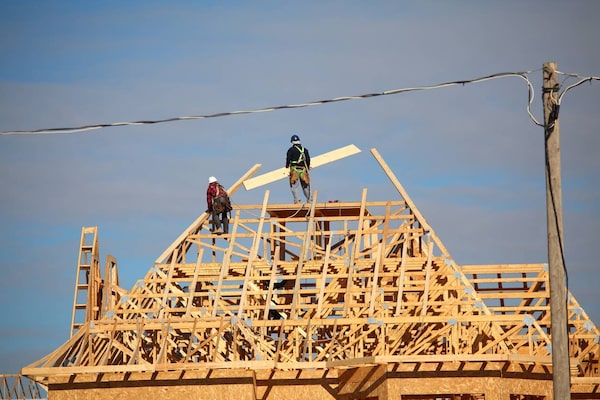
Two roofers standing on top of the roof frame of a new house in Vaughan, Ont.bukharova/Getty Images
The federal government is developing a model building code to make existing homes more energy-efficient, but the requirements could impose new costs on owners when they renovate or sell their houses.
Although energy-efficiency guidelines have applied to new construction homes in the past, the planned model energy code is the first that will apply to existing houses and will outline technical standards that aim to ultimately make houses "net-zero" energy users by upgrading features such as insulation, roofs, windows and lighting.
The code is expected to be completed by 2022 as part of a broader package of measures under the pan-Canadian framework on clean growth and climate change, which lays out a process for Canada to meet its greenhouse gas reduction targets by 2030. The government is targeting energy efficiency in buildings as part of its plan because one-quarter of Canada's current greenhouse gas emissions come from residential, commercial and institutional buildings.
The energy-efficiency renovations are expected to be required at major "life-cycle events" for a house, such as when they are being renovated, but the rules for implementation will be determined by provinces when they adopt the standards into provincial building codes.
The Canadian Real Estate Association (CREA), which represents real estate agents across Canada, said it is "very concerned" about a proposal that the work could be required when houses are sold, potentially forcing homeowners to do renovations before they can list their homes for sale.
"This is an issue that has the potential to fundamentally change home buying and selling dynamics in Canada," said CREA spokesman Pierre Leduc.
Senator Judith Seidman, a member of the Senate's energy and environment committee, which is doing a major review of the challenges of transitioning Canada to a lower-carbon-usage economy, said she finds the new energy code requirements "extremely worrisome" for anyone planning to renovate or sell their home.
The committee recently heard testimony from an official at Natural Resources Canada about the planned new energy code and was told the idea is that the standards would likely be applied at "major building life-cycle events (e.g. at renovation, sale, change of occupancy etc.)," according to slides of the Senate presentation.
"I'm particularly concerned about seniors who are planning to sell their home and move into a retirement residence," Ms. Seidman said. "By all accounts, they could be slapped with a massive renovation bill to bring their family home up to code before they can sell."
Model building codes are developed federally, but provinces decide whether to adopt the guidelines into actual building codes and will set the criteria for when they will be applied, said Philip Rizcallah, director of research and development for construction at the National Research Council.
Mr. Rizcallah said he doubts provinces would create onerous implementation requirements that would require all homeowners to suddenly meet new energy efficiency standards.
"I would be extremely, extremely surprised if the provinces came back and said, 'We have a new code that just came out in 2022 and we're going to adopt it in 2023 and everybody must meet this code today,'" he said. "It will never happen. It has never happened in the past."
He said provinces could give homeowners a period of time to complete work to the new standards or could require it to be done at a time when a house is already being substantially renovated. He said a requirement to meet the new standards on the sale of a house could be an option, but it depends what provinces decide to do.
"We've heard talk of that, but it's sporadic among some jurisdictions, and nothing has come back saying this is how we're going to impose this. I'd be surprised if that's how they did it."
The National Research Council provides research and administrative support to develop the model building codes. The codes are overseen by the Canadian Commission on Building and Fire Codes, a volunteer committee with public, regulatory and industry representatives.
The commission will open the proposed guidelines for public comment once they are in place, Mr. Rizcallah said.
While the federal model building codes are just guidelines, most provinces have eventually adopted them in the past, Mr. Rizcallah said, although they have moved at different speeds. He said the NRC consults with provinces while developing codes to ensure the final versions have wide support before they are finalized.
He said he has seen estimates of the incremental extra cost of building a new home from scratch to meet "net-zero" energy usage requirements that range from no additional cost to as high as $37,000 per house. But he said he does not know how much it would cost to renovate an existing home to the standards.
If owners need to replace a roof anyway, for example, Mr. Rizcallah said the cost of meeting the new energy standards may be negligible if energy-efficient building materials are available at the same price. As a result, the costs may not be extremely high if regulations only require changes at the time renovations are already planned.
He said the NRC anticipates manufacturers will respond to new demand with cheaper building materials that meet the new energy-efficiency standards.
"This is what we hope will happen," he said. "Obviously there's a transition when you go to something new and different, but markets generally catch up to that fairly quickly."
Mr. Rizcallah said governments may also decide to provide tax rebates or grants to help home owners meet the new guidelines.